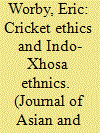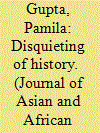| Srl | Item |
| 1 |
ID:
086270


|
|
|
|
|
| Publication |
2009.
|
| Summary/Abstract |
India and South Africa have long been mutually implicated in a common ethical field. The principal motivation for both scholars and inhabitants of these two large social formations to take an interest in one another - to make comparisons as much as to actively recall or forge connections - derives from a shared preoccupation with civic virtue and private ethics. In this article, I examine postcolonial cricket and a beauty contest as exemplary arenas in which common concerns about race, justice, identity and democracy may be discerned and debated.
|
|
|
|
|
|
|
|
|
|
|
|
|
|
|
|
| 2 |
ID:
086269


|
|
|
|
|
| Publication |
2009.
|
| Summary/Abstract |
This article examines the trajectories of democratization in India and South Africa. Both democracies are exemplary cases of democratic consolidation but face critical challenges in deepening democracy. Focusing on the notion of `effective democracy', the article argues that subordinate groups have limited opportunities for meaningful engagement with the State. This problem is explored through an examination of social movements and local government. The article shows that the current crisis of citizenship that both countries face results from the subordination of civil society to political society.
|
|
|
|
|
|
|
|
|
|
|
|
|
|
|
|
| 3 |
ID:
086265


|
|
|
|
|
| Publication |
2009.
|
| Summary/Abstract |
This article presents a case study of Goan Mozambicans - a diasporic group created out of the itinerant quality that characterized Portuguese (de)colonization in the Indian Ocean. Many chose to emigrate from Portuguese India to Portuguese Africa between the 1920s and 1950s. That some Goans chose to stay while others left in the aftermath of Mozambican independence (1975) is also tied to this migratory history. An ethnographic life history approach is employed to access individual varied experiences of migration. Findings will suggest that Goan Mozambicans occupied an ambiguous position in the colonial order of things, and identify them as local cosmopolitans in postcolonial Mozambique.
|
|
|
|
|
|
|
|
|
|
|
|
|
|
|
|
| 4 |
ID:
086267


|
|
|
|
|
| Publication |
2009.
|
| Summary/Abstract |
This article compares labour migrancy and urbanization in several of the leading cities of South Africa and India. It begins by noting the pervasiveness of single male oscillating labour migration between rural areas and city employment in both societies up until the 1950s, despite fundamentally different institutional and political arrangement in each state. It highlights and explores the issues of social structure and culture in both societies, both pre-colonial and colonial, in explaining the dynamics of migrancy and urbanization, including which sections of village society migrated and with what effects. The article explores different modes of living in and adapting to urban environments, and particularly the different social trajectory of women and youth in both societies and the implications of each for social stability. It finally asks why historians and other social scientists have adopted such distinctive approaches to each society.
|
|
|
|
|
|
|
|
|
|
|
|
|
|
|
|
| 5 |
ID:
086268


|
|
|
|
|
| Publication |
2009.
|
| Summary/Abstract |
This article compares the ideological renewal of the Communist Parties in Kerala, India and South Africa during the 1990s. Based on archival research of Party documents, the article follows the Parties' ideological journeys that led them to theorize remarkably similar visions of `socialist democracy' around four common themes: participatory democracy; a new developmental state; the coexistence of capitalism and socialism; and the extension of civil society and the State in the economy.
|
|
|
|
|
|
|
|
|
|
|
|
|
|
|
|
| 6 |
ID:
086264


|
|
|
|
|
| Publication |
2009.
|
| Summary/Abstract |
Pick up any South African newspaper or tune in to any broadcast programme and before long, one is likely to come across some item on India. Whether an advertisement for perticular model of Tata or Mahindra motor car, or a report on the growing trade and investment links between the two countries, every day brings mounting evidence of the marked intensification of relations between South Africa and India.
|
|
|
|
|
|
|
|
|
|
|
|
|
|
|
|
| 7 |
ID:
086266


|
|
|
|
|
| Publication |
2009.
|
| Summary/Abstract |
The introduction of the steamships on a large scale in the late 19th century saw African and Asian sailors becoming a central component of the workforce of the British merchant marine. This development was met with considerable resistance from British seamen who saw these workers as a cheap labour force that would undermine their established position. This article interprets the steam empire as a set of overlapping webs, comprising the shipping companies, British diasporic labour and Indian Ocean seafarers. It traces how a racialized politics was generated within these webs, and the major conflicts to which this gave rise.
|
|
|
|
|
|
|
|
|
|
|
|
|
|
|
|